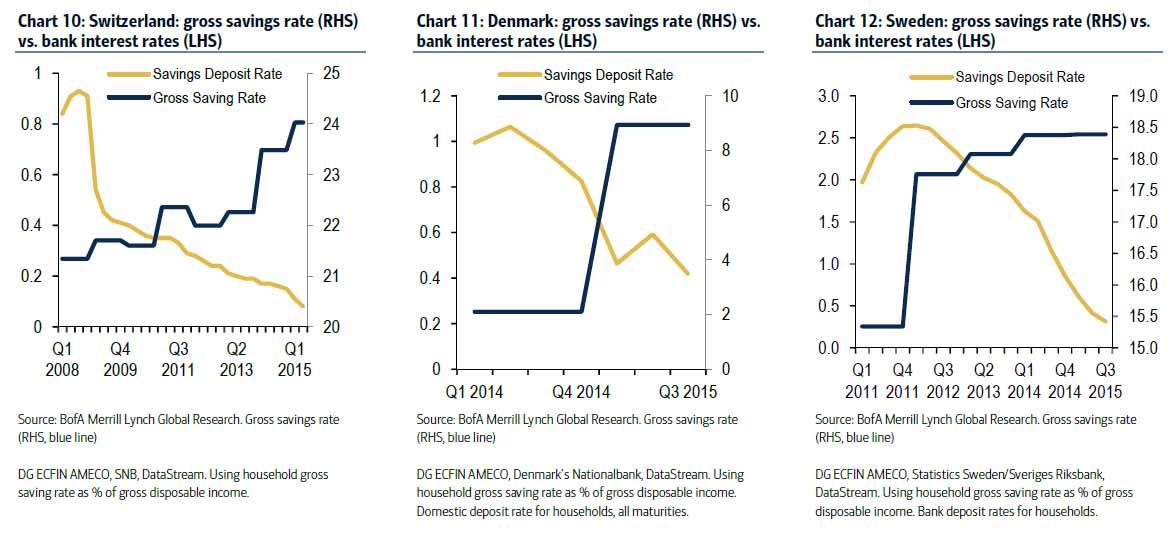Deutsche Bank Capitulates: Starts Charging Negative Rate On All New Deposit Accounts Over €100,000
It has been a long time coming and it’s finally here.
When the ECB first unleashed negative rates across Europe in 2014, banks were loathe to match the central bank’s deposit rates for their clients to those charged by the ECB over fears depositors would simply take their money and go elsewhere. After all, the premise of paying a bank for the privilege of holding your money is still absolutely insane to most normal people.
However, as the years went by, and as the ECB’s negative rates kept rising – or rather dropping – banks were forced to quietly admit they had no choice and starting at the very top, targeting only corporate clients and the biggest depositors, European banks started imposing negative deposit rates while hoping they could avoid going all the way to the smaller savers.
Indeed, just last November, Deutsche Bank vowed that it would pass on negative interest rates only to larger corporate customers or the deposits of wealthy individuals and spare most retail clients, Deputy Chief Executive Officer Karl von Rohr said, explaining that German banks have already paid several billion euros in penalty rates for their deposits with the European Central Bank and Deutsche Bank’s payments amount to “several hundred million euros for 2019.”
Now, less than half a year later, the Frankfurt-based bank – which itself is in dire financial straits – has capitulated and to avoid paying the ECB’s punitive rate will soon introduce negative interest rates for even its medium depositors.
A Deutsche Bank spokesman told Handelsblatt that “The ongoing pressure from negative interest rates makes it necessary for Deutsche Bank to charge custody fees for new accounts exceeding €100,000 starting May 18, 2020.” The “deposit rate” of -0.5% is equal to the rate the ECB charges banks for money parked there.
“This helps us on the earnings side, but above all it helps to prevent further inflows of particularly high deposits that cost us money,” wrote Manfred Knof, head of the bank’s German private customer business, to his employees. This applies “especially in the event that other banks further adjust their conditions and their customers are looking for an alternative for their deposits with us.”
In other words, with the ECB flooding the European financial system with a tsunami of liquidity – one which it expanded today with yet another meaningless long-term refi operation as if that will do anything to help banks who can no longer earn a net interest margin arb become solvent – Europe’s banks no longer need deposits, and in fact will do everything they can to push away all but the smallest depositors. The good news, for now, is that “existing account contracts are not affected” however we expect that to change soon.
So with European banks finally cracking down on the bulk of their depositors instead of just the top 1% and corporate clients, what happens next?
Well, savers who collectively owns trillions in European bank deposits that are now non grata have two options: either pull the money out, convert it to cash and store it in a safe (something Germany has a lot of experience with especially in late 2016 when Deutsche Bank was on the verge of collapse, sparking a rush to buy safes) where it is outside of the financial system – this is precisely the alternative the ECB prepared for several years ago when it stopped printing the €500 banknote, or more likely, buy alternative physical assets which – in a time of pervasive deflation and negative rates – do not charge a penalty rate, such as gold or even cryptos.
So if over the next few months a wave of “mysterious” buying emerges and lifts all non-cash assets, we will know why: the real great rotation will have begun.
Tyler Durden
Thu, 04/30/2020 – 22:20![]()
Zero Hedge’s mission is to widen the scope of financial, economic and political information available to the professional investing public, to skeptically examine and, where necessary, attack the flaccid institution that financial journalism has become, to liberate oppressed knowledge, to provide analysis uninhibited by political constraint and to facilitate information’s unending quest for freedom. Visit https://www.zerohedge.com
